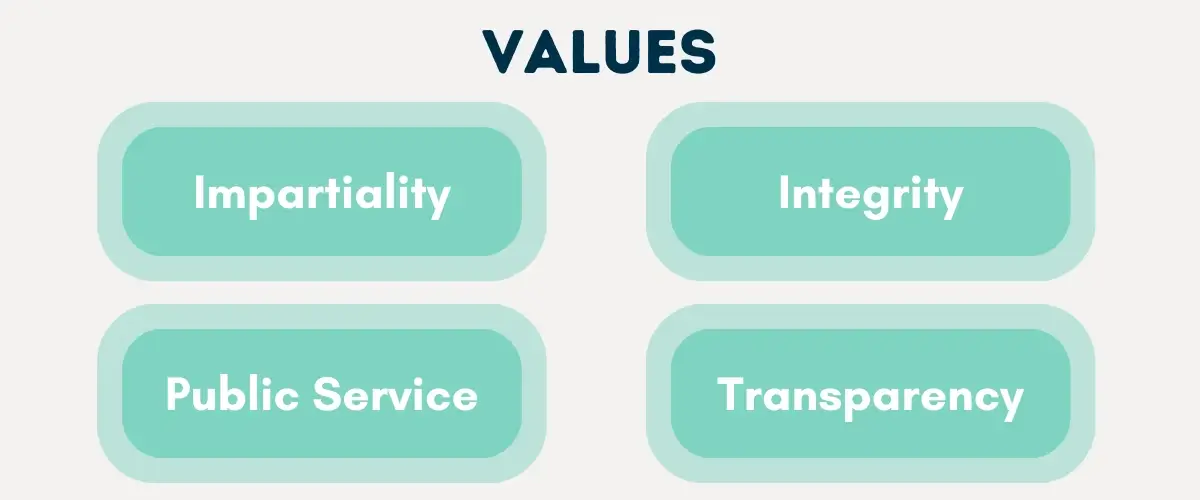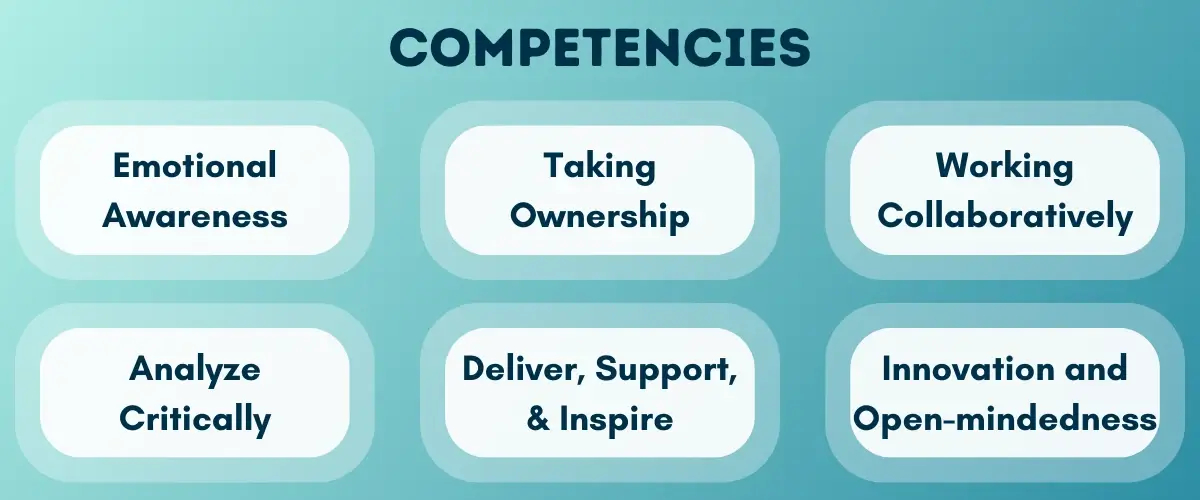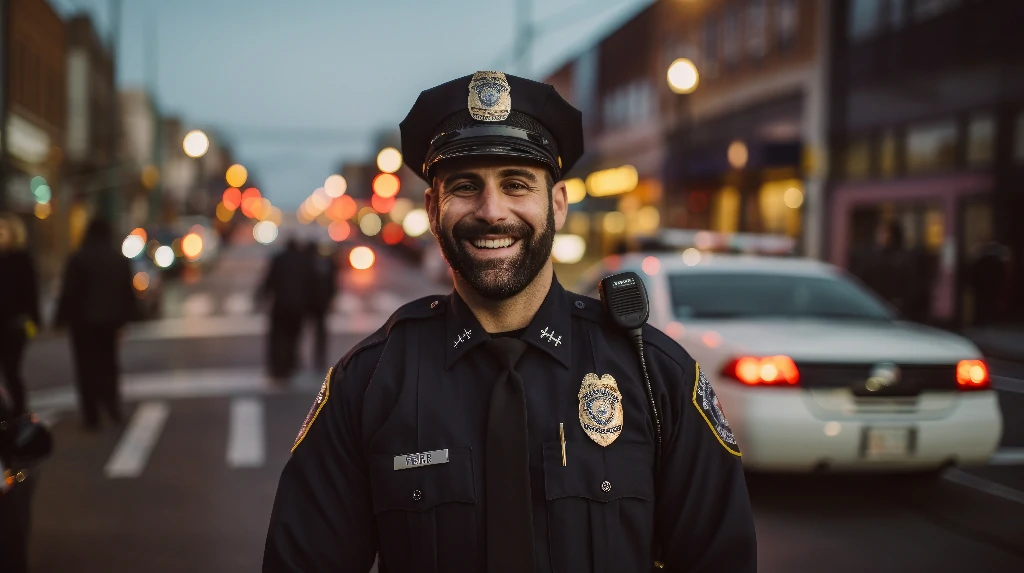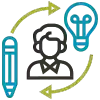Get Ready for the Police Situational Judgment Test with our Prep Course
- Overview
- Test Format
- Practice Test
- Curriculum
Making a career in the field of law enforcement is a challenging journey, filled with unique hurdles. Recruiters face the daunting task of identifying individuals with the emotional resilience and aptitude to excel in the demanding and high-pressure world of policing. Among several tests to pick the “right” candidate, recruiters often rely on the Situational Judgment Test (SJT), an effective assessment tool that evaluates decision-making and judgment skills through real-life scenarios.
Preparing for the SJT may seem overwhelming, but the PrepTerminal Police Situational Judgment course is here to help. In our course, we immerse you in common situational judgment questions tailored to law enforcement applications and enhance your preparation with specialized strategies and practice tests specifically designed to boost your readiness and understanding of the exam. Our ultimate goal is to empower you with the necessary skills to approach the exam with confidence and think like an officer in challenging situations.
Let’s start building your skills and confidence for the test by understanding SJT in more detail.
Free Police Situational Judgment Practice Test
Check Out the Question Types
What is a Situational Judgment Test?
The Situational Judgment test presents scenario-based questions to the candidates with a list of multiple options each reflecting a certain course of action. It assesses their capacity to make logical and lawful decisions under stress while evaluating their ability to represent themselves and the values of the police service effectively. Essentially, it allows candidates to step into the shoes of a police officer and gauge their ability to choose the appropriate course of action.
The SJT serves as a valuable tool for recruiters, enabling them to evaluate a candidate’s decision-making skills while also assessing their alignment with job-specific behaviors. This assessment aims to predict a candidate’s potential job performance and provides them with an opportunity to showcase their strengths and abilities in a real-world context.
Personal Characteristics of Police Officer
The role of a law enforcement officer demands a specific set of personality traits and characteristics. These traits are vital not only for effective law enforcement but also for fostering trust and maintaining a positive image within the community. Let’s take a look at the key values and competencies that can be considered as non-negotiable for the role:
Values
Values are strong beliefs that guide a person’s actions. In the role of an officer, specific values are not just expected but essential:

- Impartiality: As an officer, impartiality means being fair and unbiased when dealing with people and situations. It is crucial for effective duty performance.
- Integrity: Integrity involves being honest and adhering to established rules and protocols, even when no one is watching. It encompasses upholding ethical and moral principles.
- Public Service: A police officer’s primary responsibility is to serve the community. Officers must remain motivated to serve the public without showing favoritism to any individual, group, or situation.
- Transparency: Maintaining public trust is integral to the role. This is achieved through transparency in actions, involving openness and honesty in all interactions and duties.
Competencies
Competency refers to the fundamental skills and knowledge that are essential for individuals aspiring to become police officers. Several key competencies are expected in candidates pursuing a career in law enforcement:

- Emotional Awareness: Being emotionally aware is a crucial skill for police officers. It involves recognizing and effectively managing emotions, both one’s own and those of others. This skill is particularly vital for making rational decisions, especially in challenging and emotionally charged situations.
- Taking Ownership: Demonstrating accountability and responsibility for one’s actions is a fundamental trait expected of police officers. Assuming ownership of one’s actions is integral to maintaining trust and confidence in the police force.
- Working Collaboratively: Collaboration is inherent to policing, as officers often work as part of a team. Police officers are required to cooperate effectively with their colleagues and other units to accomplish objectives and ensure community safety.
- Analyze Critically: Critical analysis entails the proficient assessment of information and data, especially in complex scenarios, to uncover underlying issues and make well-informed decisions.
- Deliver, Support, and Inspire: This competency involves understanding the organization’s goals, priorities, and vision. It centers on creating an environment characterized by mutual respect and support, fostering the achievement of goals by assisting and inspiring those around.
- Innovation and Open-mindedness: Flexibility is indispensable in policing, given the dynamic nature of law enforcement. Being inquisitive and open-minded enables officers to approach problem-solving with creativity and adaptability.
Question Types and Formats
Understanding the diversity in question types and formats within Situational Judgment Tests (SJT) is crucial for candidates preparing for a career in law enforcement. The structure, design, and number of questions in an SJT can vary depending on the department or organization conducting the test.
This test presents candidates with a range of realistic scenarios based on the situations the police officers face on and off duty. Each scenario presents you with multiple-choice options each representing a certain course of action.
Here are some typical formats that you may encounter:
| Question Format | What does it Entail? |
|---|---|
| One-Choice Response Format | Choose one (best or worst option, however, the question is framed) for the given situation |
| Two- Choice Response Format | Choosing the most appropriate and the least appropriate options from the given options |
| Ranking Format | Ranking the responses from the given options, typically presenting these 5 options: counterproductive, ineffective, slightly effective, effective, and very effective. |
| Rating Format | Rating the effectiveness of the options presented on a scale of 1 to 5. |

Police Situational Judgement Course
Last Updated: Mar 05, 2025
Course Content
 Introduction2 Steps - 15 MinutesBuy this Course: Get full access to all lessons, practice tests and guides.
Introduction2 Steps - 15 MinutesBuy this Course: Get full access to all lessons, practice tests and guides. Personality Profile Overview1 Step - 1 Hours & 10 MinutesBuy this Course: Get full access to all lessons, practice tests and guides.
Personality Profile Overview1 Step - 1 Hours & 10 MinutesBuy this Course: Get full access to all lessons, practice tests and guides. Question Types and Formats1 Step - 45 MinutesBuy this Course: Get full access to all lessons, practice tests and guides.
Question Types and Formats1 Step - 45 MinutesBuy this Course: Get full access to all lessons, practice tests and guides. Tips and Strategies1 Step - 1 Hours & 25 MinutesBuy this Course: Get full access to all lessons, practice tests and guides.
Tips and Strategies1 Step - 1 Hours & 25 MinutesBuy this Course: Get full access to all lessons, practice tests and guides. Practice Quiz - Best Choice2 Steps - 40 MinutesBuy this Course: Get full access to all lessons, practice tests and guides.
Practice Quiz - Best Choice2 Steps - 40 MinutesBuy this Course: Get full access to all lessons, practice tests and guides. Practice Quiz - Most / Least2 Steps - 35 MinutesBuy this Course: Get full access to all lessons, practice tests and guides.
Practice Quiz - Most / Least2 Steps - 35 MinutesBuy this Course: Get full access to all lessons, practice tests and guides. Practice Quiz - Ranking2 Steps - 45 MinutesBuy this Course: Get full access to all lessons, practice tests and guides.
Practice Quiz - Ranking2 Steps - 45 MinutesBuy this Course: Get full access to all lessons, practice tests and guides. Practice Quiz - Rating2 Steps - 40 MinutesBuy this Course: Get full access to all lessons, practice tests and guides.
Practice Quiz - Rating2 Steps - 40 MinutesBuy this Course: Get full access to all lessons, practice tests and guides.
Why Choose our Situational Judgment Prep Course?
Qualified candidates often struggle with the Police Situational Judgment Test due to its format and questions. At Prepterminal, we provide features to boost your confidence and demonstrate your job suitability. Take a look at the features that make our course the best choice for navigating the nuances of the SJT:
Comprehensive Prep Guide
We have developed thorough and detailed lessons for each SJT-related topic. These lessons encompass everything, from elucidating the officer’s personality profile to delving into question types.
Simplified Learning
We have structured the content into lessons that are clear and easy to understand, making the content more approachable and less intimidating.
Confidence Through Practice
We provide practice sets for the covered topics after the lessons. This means you won’t just learn the material; you will get to apply it, reinforcing your understanding and building confidence.
Dedicated tips and strategies
Within the lessons, we have dedicated a section to provide effective tips and strategies for approaching the SJT with assurance.
Tailored Question Sets
We have crafted specific question practice sets for each question type, ensuring you’re well-prepared for any variation.
Flexibility
Study at your own pace with 24/7 access to course materials.
Frequently Asked Questions (FAQs)
You’re permitted to take the Police Situational Judgment Test only once during the recruitment process. Failing to meet the required standard typically results in the discontinuation of your application. However, there may be exceptions where you’re allowed to reapply for the role at a later stage, necessitating a retake of the situational judgment test.
This test is crafted to evaluate your decision-making skills in workplace scenarios, so the best advice is to be authentic. While responding, think like an officer while staying true to your own qualities. Here are some additional tips:
- Carefully assess each scenario and potential response before selecting an answer.
- Understand the expectations and demands of the officer role as you respond.
- Notice response patterns and subtleties. For instance, if you make decisions confidently but overlook consensus-building, it reveals aspects of your personality that SJTs assess.
- If asked to rank responses, compare them against each other. Remember, they may all be effective or ineffective; your task is to prioritize them.
- Pay attention to instructions. SJTs vary in format, so the test you take may differ from practice versions.
Situational judgment tests differ from other aptitude assessments in scoring. Instead of assigning one mark for each correct answer, results are mostly compared to an ‘ideal candidate’ set of responses. These ideal responses exemplify the desired personality traits and work behaviors sought by the recruiter.
Unlike numerical and verbal reasoning tests, situational judgment tests rely on subjective answers. Therefore, successfully cheating on these tests is highly unlikely.
In preparation, understanding the company’s values, culture, and required competencies is essential. While not considered cheating, aligning your responses with these factors helps demonstrate your suitability for the role.
Our course cannot guarantee a specific score or selection outcome. Test performance relies on several factors, including department policies, individual performance and understanding, and personality traits. However, our course is designed to acquaint you with the assessment process, various question types, and provide valuable practice opportunities.

Created by: Tanoo Purohit
MSc - Clinical Psychology, Psychometric Tutor, Prepterminal Test Expert
280 students, 4.3, 52 Reviews
I’m Tanoo Purohit, with a BA honors and an MSc in Clinical Psychology from the renowned National Forensic Sciences University. Over seven years, I’ve studied the intricacies of the human psyche (as a part of my curriculum and practice). Proudly associated with PrepTerminal, I serve as a Psychometric Course Author and am recognized as a Psychological Test Expert. In every course I craft, I merge my expansive knowledge with relatable insights, ensuring that complex psychological concepts are presented with clarity and resonance for all learners. Feel free to contact me at [email protected].

